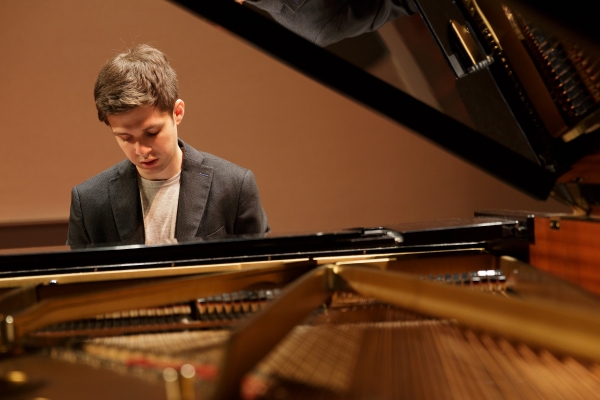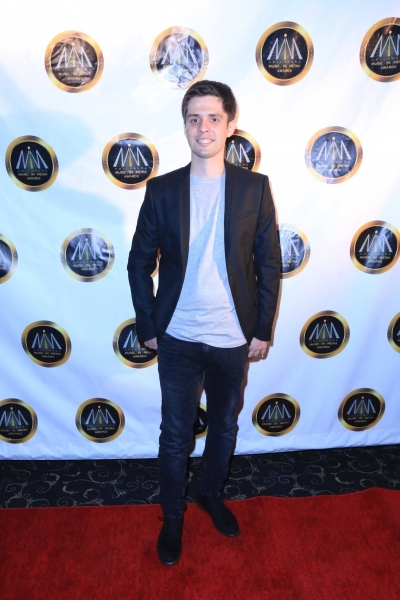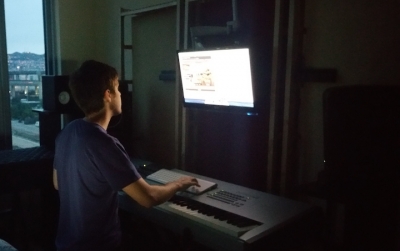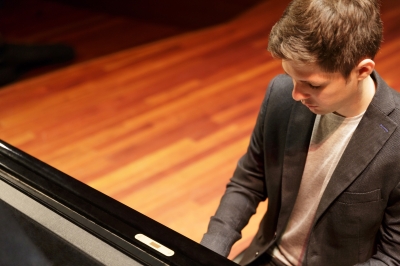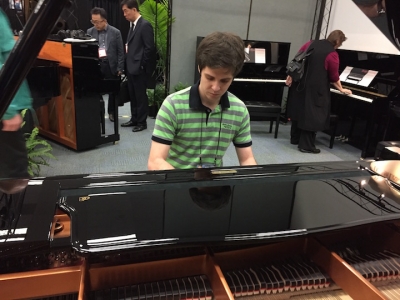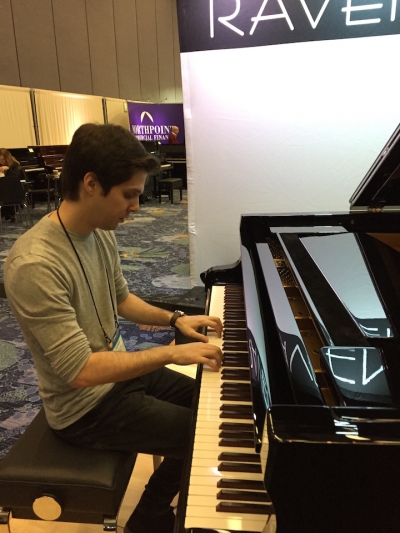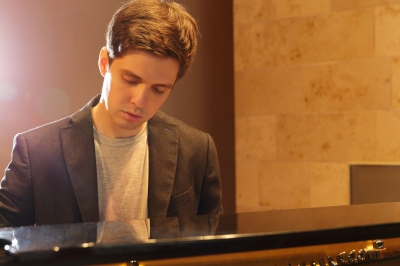One of the things I like best about reviewing music is the opportunity to discover really promising new artists and to help them get the word out about their music. Samer Fanek is one such artist. I loved his debut album,
Wishful Thinking, and was delighted to meet him at a concert during the NAMM and Whisperings Solo Piano Radio weekend this past January. He will be performing a house concert here in Florence, Oregon on May 6th, and I’m really looking forward to that! I think you’ll enjoy getting to know him, too!
KP: Hey Samer! How are things in the SF Bay Area?
SF: Hi Kathy! I recently moved from the South Bay to San Francisco so I’m enjoying the city life and having everything within walking distance, especially since I don’t drive. I’m also discovering the tricky San Francisco weather which looks nice and bright, but then you go outside and you realize it isn’t what you thought it was when you looked out of the window!
How about you? How are things in Oregon?
KP: Mostly fine. We aren’t getting any let-up in the rain here on the coast, so we’re all getting really tired of it. However, it should be REALLY green when you come up in May for your house concert!
SF: Oh I’m really looking forward to it! I’ve always wanted to visit Oregon, but never did for some reason. Hopefully my music will allow me to visit more places. This year so far, outside of the Bay Area, I went to Los Angeles, Monterey, Minneapolis, and will be discovering Oregon and New Orleans in May. I can’t wait until I get to a point where I’m touring different cities every day, where I get to discover things about the city during the day, and perform music at night. I don’t think I’m the sort of person who’d like to settle in one place or another (yet!) so I imagine that kind of lifestyle will work for me.
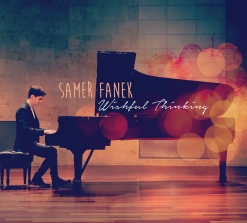
Click on album cover to go to Kathy's review.
KP: I really hope that works out! Your debut album, Wishful Thinking, is doing incredibly well and you have been nominated for and have won a very impressive number of awards. Most recently, you were nominated for the Zone Music Reporter’s “Best New Artist” and “Best Neo-Classical Album” awards at this year’s Awards Program in New Orleans. First, congratulations (again!!!)! What are some of the other nominations and awards?
SF: Thank you! I only recently discovered that the ZMR awards happen to be one of the main events for artists in this genre, so being nominated in two categories right off the bat sounds pretty cool!
When I released
Wishful Thinking I began to find out about all these awards, so I just submitted my album to a bunch of these websites and forgot about it. Then I started getting all these emails about being nominated or winning this award and that award, and it felt really nice to have my work validated by other people, especially when the judges also are fellow musicians themselves.
The first awards my album won were two silver medals in the Global Music Awards in two categories. I think later that year New Age Music Guide picked my album for Best New Age Music Debut Album of 2016, and very recently, out of the blue, my “Freefall" composition from the album won first place in the 18th Annual Great American Song Contest. These are the latest ones that I know of so far..
I really liked what came out of my nomination for the Hollywood Music in Media Awards because I got to go to Los Angeles and experience my first red carpet event. I met a lot of talented musicians and made some friends, although I must say I did feel uncomfortable being photographed at the red carpet because it’s not something I’m used to!
KP: That must have been really exciting! Are you working on your second album? If so, what is the new music like?
SF: Oh yeah! I haven’t yet decided on the title, but it is very likely is going to be called Guide Me, which I’m naming after my favorite composition in the album so far.
After many repeated listens to my debut album, I discovered after releasing it that there are certain things that I would have loved to improve, or some production or arrangement direction that I wish I would’ve done differently, but once it’s out, it’s out!
The second album will be similarly composed of piano-driven pieces backed by an orchestra and synthesizers, but I think I’m teaching myself some restraint to not overcomplicate arrangements and make sure the essence of the song is more clear. The album will have a mix of warm and quiet pieces that blend with more powerful and dramatic ones, so there will hopefully be something for everybody. If people feel what I intended when they listen to each song, I’ll be happy.
So far I’ve composed 40-something new short ideas from which I already picked the best 15, and now I’m working on developing them into full-blown compositions.
KP: I would imagine that it’s kind of daunting to do a second album when your debut has done so well.
SF: I do feel some kind of pressure there, especially that it will likely be compared with the accomplishments of my first album. At the same time, I’m very excited about it because I get to come up with new ideas and try new things. Fingers crossed that it will do as well or better than the first one!
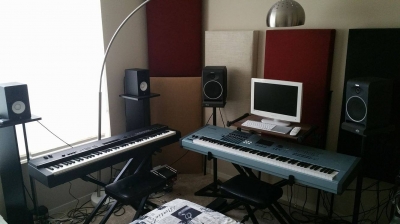
Samer's bedroom studio.
KP: I understand that you did most of the creation of Wishful Thinking in your bedroom studio. That’s pretty amazing - unless you have a huge bedroom! Do you have a lot of equipment in there?
SF: Thanks! My bedroom size is just your average bedroom size. I love waking up and being able to just turn all the equipment on and start working without even leaving the room. My studio consists of two YAMAHA keyboards, a bunch of different monitor speakers to test the mix, a small hardware mixer, and a powerful Mac Pro computer running Logic Pro that glues everything together. I’ve also acoustically treated the room with things like bass traps to get a more clear sonic image, and not leak the sound to the neighbors, and recently my fiancee and I further made it cat-friendly for our two cats!
I think the studio setting that I created over the years is nowhere near as complicated as some of the studio pictures I see online, but I think at this point I have everything that I need to create music. This is probably because I rely exclusively on virtual instruments and “virtual gear” to recreate the sound of any instrument that I want on the keyboard. If I need a cello section, I don’t need to invite a bunch of cellists to my bedroom (although that will be fun, especially for the neighbors!) Instead, I choose a virtual instrument of 10 cellos and play these parts on my keyboard, then add articulations and effects to make them blend in and hopefully not sound artificial. Similarly if I need more reverb or chorus, I can try out a bunch of sound processing plugins until I arrive at something that sounds like I want it to.
Over the years I’ve accumulated such a crazy amount of these virtual instruments and sound processors that make it possible to create a whole album with orchestra and synthesizers and all sorts of diverse instruments. I like the idea that nowadays you can create a full-blown album this way.
KP: Let’s back up and find out more about your background. Where were you born and when did you come to the US?
SF: I was born in Amman, Jordan to a Polish mom and a Jordanian dad. That kind of combination exposed me to both cultures where I tried to take in the best qualities from each one. I spent most of my life in Jordan, although I was traveling to Poland for a few months almost every summer to visit my mom’s family.
I moved to the US in 2008 to complete a Master’s degree in computer science at the University of Illinois at Urbana-Champaign, and I think it was over there that I realized how much I enjoy making a positive impact on people through music. I had a favorite spot on campus called the Illini Union where I’d go and perform on the grand piano almost every day after classes. I loved seeing people’s reactions and having them describe to me how a song made them feel. Eventually that idea became my dream, which is to be able to create music that affects people’s lives emotionally and eventually do that on a large worldwide scale. I feel this is the contribution I want to make to the world in my lifetime.
KP: Have you ever taken piano lessons?
SF: There was a brief period of time when my mom signed me up for piano lessons, but I really disliked them. I had already discovered how to teach myself by listening to songs that I like, and figuring out what each instrument is doing by ear, and recording that through my keyboard to the computer. I was essentially recreating songs by ear and in the process, learning about all the different instruments and what they can and cannot do.
At first it was a frustrating trial and error process that required intensive and repetitive listening to get the right pitch, or the right chords, but I kept doing it for so many years that it became somewhat instinctive to listen to a song and translate it on the piano in real time.
I was lucky enough to be born in a time where I could get away with not learning how to read or write notes to create music, because I can just record what I have in mind and make any edits on the fly to the recording. However, I do think that it will be a little bit problematic if I ever want to present my music to an orchestra, which is something I dream about doing someday. I’ll very likely hire a transcriber and trust that they’ll do a good job of translating what I had in mind to other players.
KP: When did you start composing music?
SF: I think I might’ve created a few short compositions back when I was 13 or 14, but I started taking composing more seriously after graduating high school. I think by then I had gathered enough experience covering so many songs that I thought it’s time to try to create original instrumental music and see if I can do it. So I’d say that I was probably 18 or 19 was when I started doing it properly, and only last year I finally picked my favorite compositions from all sorts of ideas that I’ve accumulated over the years and finished a whole album.
KP: How long did you work as a software developer? Was that in the Bay Area?
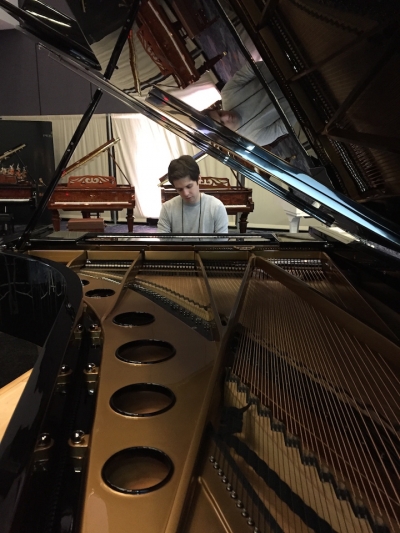
At NAMM in Anaheim, CA 1/17
SF: Almost five years. I originally started working in software in Seattle and then I relocated to the Bay Area three years ago. One thing I appreciated about my software development job is that it enabled me to pay for all the studio equipment and software, so in a way it was enabling my dream by financing it. It probably also contributed in making it possible for me to build my own studio without needing to hire anybody.
By the end of 2015, I decided to leave my software developer job to do music full-time because I wanted to spend all my time and energy on music exclusively, and I also realized I’d never finish the album at that pace if I kept doing software during the day and music at night and on weekends. In all of 2016, I dedicated every waking hour to music-related things like composing new material, and doing all the other aspects of the music business like distribution, promotion and lots of other things in between. I must say 2016 has been my favorite year of all my life for this reason.
KP: Are any of your family members musicians?
SF: A few years ago I would’ve said no, but my brother Toma has been showing such great promise and progress on the piano and electric guitar, so for now there’s only the two of us. I think there might very well be more in the next couple of years, as Jordan nowadays is making it more possible to have a more viable career in the music and arts fields.
KP: Has any of your family come to the US, or just you?
SF: Right now I’m the only one in the US, and my family is currently back in Jordan. Last time we met in person was last December and hopefully we’ll meet again in Jordan or Poland in the upcoming summer. I really appreciate how patient they are with me, especially when I’m not the most available person in the world when I’m working on music. I tend to disappear for extended periods of time into my own music bubble, then apologize profusely when I’m out of it!
KP: I know that you are a big fan of Yanni and his music. Who and what are some of your other musical influences?
SF: I think Yanni is my biggest influence not only because I love his music, but he was also self-taught and moved all the way from Greece to the US to study a non-music-related field, only to discover what he wanted to dedicate his life to music later on. I see parallels between his story and mine in the sense that I also was self-taught and came all the way from Jordan to study computer science, and eventually realized that I wanted to compose and perform instrumental music for life. I have still such a long way to go to actually accomplish a tiny fraction of what he did!
I also tend to gravitate towards movie and video-game composers like Hans Zimmer and Nobuo Uematsu, especially because they create music that makes me ignore the movie that I’m watching, or the video game that I’m playing, and just focus on the music and the emotions it’s making feel. I’m also a big fan of progressive rock and progressive metal genres so the sound of Muse and Dream Theater tends to sometimes influence the compositions that are on the more powerful side.
KP: Do you play any musical instruments besides piano and keyboard?
SF: I tried to teach myself electric guitar at some point, but I lost the patience, especially given that I have immediate access to a keyboard where I can accomplish the same thing (I hope guitarists won’t kill me for saying that!)
For example, the song “Universe” on the album has a guitar solo which I performed at the keyboard and I’d like to think it sounds pretty realistic! Also the song “Escape” has distorted guitar chords in the chorus that I also played on the keyboard. I think electric guitar is such an expressive instrument and I can see it making its way to more compositions in the future.
KP: Have you done much live performing at this point?
SF: Not as much as I would’ve liked, to be honest, and this is something I’m actively trying to improve. I’ve been mostly doing local house concerts and I’m still trying to navigate the maze of steps I need to take that can land me bigger things. I’ve contacted a couple of musicians for ideas for finding concert opportunities and it seems to me that each one has their own unique story of finding the path to doing bigger gigs. I just have to discover mine.
KP: We met this past January in Southern CA at a concert performed by Michele McLaughlin, Adam Andrews and Joe Bongiorno at Kim’s Piano in Stanton. That’s a pretty amazing piano store, isn’t it? The concert was good, too!!!
SF: Yes! I’d love to have access to so many pianos like they do at Kim’s Piano, although if I was working there I’d be a lousy employee because all I’d be doing is trying all these pianos out and not paying attention to anything else.
I enjoyed the whole concert event, and I find it interesting to hear the different musicians’ stories about what got them to the point of performing at that concert. I also finally got to meet people who work in the genre that I only knew on Facebook or by email. That’s how I recognized you at the concert after your amazing review of my album, and here we are!
KP: You were also there for the NAMM (National Association of Music Merchandisers) Show. Did you try all of the pianos there? Did you find a favorite?
SF: This was my first NAMM show, and I am pretty certain it showed because I tried every single brand of piano that was out there. It must’ve annoyed some of the staff there because I kept coming back to the piano room and playing different songs on each.
My dream piano is the Fazioli F278 concert grand, and I think if I ever have a materialistic goal in life, it will be to purchase one of these. I also got the chance to meet the owner and compliment him for his amazing work.
Another close favorite is the Ravenscroft Model 275 concert grand, which has been my favorite NAMM discovery. I even purchased the virtual instrument version of the piano so I can attempt to recreate that piano experience in my studio.
The final favorite is the Shigeru Kawai concert grand piano, which I always dreamt of trying out because I’ve been discovering that a lot of times when I think “I like the piano tone on that song” it almost always tends to be some flavor of Kawai pianos. I have an obsession of discovering the perfect piano for my compositions, and it seems like for now I’ve narrowed it down to three.
KP: Who are some of your favorite composers?
SF: I’d say Yanni, Nobuo Uematsu, Yiruma, Hans Zimmer, Queen, Muse, Prince and Dream Theater, in any order you wish! The sum of these influences will likely be heard in some shape or form in my albums.
KP: Do you have any favorite performers?
SF: I find myself gravitating towards performers with a big stage presence like Freddie Mercury, Prince and Matthew Bellamy, which is funny because our instrumental music genre tends to lean towards calm and tranquil performances. I’ve also seen Yanni a few times live in concert, and the last time I went there was not only to enjoy the performance, but also observe his stage presence and learn a thing or two of how he interacts with the audience.
KP: Yanni is still one of my favorite performers. He is so charismatic and really expresses a pure joy in making music.
What has been your most exciting musical moment or experience so far?
SF: That’s an interesting question! It’s all been exciting so far, but if I’m to choose one, I’d say the moment I completed my album and realized that a dream that I set from years back was about to come true. I was listening to track number one from the album, and I was overwhelmed with emotions just thinking that this might be the start of something good.
KP: If you could have any three wishes, what would they be?
SF: My number one wish is to someday be able to perform big concerts all around the world with a band and orchestra. And number two, the “materialistic one,” would be to buy that Fazioli concert grand piano!
Number three is probably the most unusual one. I’m a huge soccer fan and would love to someday get my coaching badges and manage a soccer team, although I’d give that away for the first two wishes..
KP: Is there anything else you’d like to talk about?
SF: Thanks for the chat Kathy! I don’t think anything comes to mind at the moment, and I hope your readers enjoyed my debut album, Wishful Thinking. Watch out for my next release!
Many thanks to Samer Fanek for taking the time for this interview. For more information about Samer and his music, be sure to visit
his website and his
Artist Page here on MainlyPiano.com.
Kathy Parsons
April 2017

